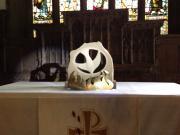When the Apostle Paul rode on to the road to Damascus he clearly didn't expect to have his life abruptly interrupted and radically challenged. But, that is exactly what happened. And the challenge was radical because it didn't involve just nuancing his comfortable or convenient faith, but, rather, went to the roots of his worldview, his life, his meaning. As Andrew Davidon says in his introduction to the book Imaginative Apologetics:
The Christian faith does not simply, or even mainly, propose a few additional facts about the world. Rather, belief in the Christian God invites a new way to understand everything.

For Paul the challenge was so debilitating because it went to the heart of who and how God is, and put a question mark over the entirely of his life, his worldview, his understanding of why the world is the way it is.
This is significant for us. For the world Paul lived in two thousand years ago is similar to ours. Christianity was tiny and nascent. The world was multicultural and multifaith. And the totalitarian demands of the Roman Empire were not supposed to be challenged. Christianity was new and was decidedly weird. And Paul did not go looking for Christian faith: it came looking for him.
This is it: the Gospel draws us. We do not choose Jesus Christ; we respond to his invitation and call to us. We walk the path of discipleship out of obedience to his call. As I have said before: we are drawn by hope, not driven by fear. Jesus chose us.
This is what Paul discovered: Christian faith found him. And, like us, Paul set about growing and losing churches in a culture that was fundamentally hostile to the Christian innovation (known in the Empire as 'atheism').
But what lay at the heart of Paul's passion was simple: as he says in 1 Corinthians 11:23, “I received… I handed on”. He didn't possess and control his ministry; rather, he received and passed on. Yet, Paul also understood very clearly that he not only received a tradition, but, by being faithful to it, created a new tradition. This reminds me of the statement by the Archbishop of Dublin, Michael Jackson, that
Tradition is the church interpreting, not the church reminiscing.
Which immediately reflects on Sir Thomas More's maxim:
Tradition is not holding onto the ashes, but passing on the flame.
(A couple of years ago I visited the town of Intercourse , Pennsylvania, to see the Amish community. This living tradition – no electricity, no modernity – had been turned into a 'heritage' for voyeurs. You could ride in their horse-drawn buggies and enjoy the 'Amish experience'. This is not what the church should be about.)
As the Diocese of Bradford ends after 95 years – during which people had to be faithful to their generation- we are faced by this hard question: what is the tradition which we have received and which we must pass on? How do we do this faithfully? And how do we do so without losing sight of the point of it all – what the heart of the 'tradition' actually is?
Christians know themselves to be loved by God. That, in one sense, is the beginning and the end of the matter. But, this 'being loved' has to be handed on. That, essentially, is what the Diocese of West Yorkshire & the Dales is all about.
Rowan Williams writes about the Eucharistic community in his wonderful and essential new little book Being Christian. He shows how each Christian community that breaks bread and shares wine together is not doing an empty ritual; it is re-telling the Story that had created and shaped it and, by comprising people who have received the grace of God then are compelled to hand on the grace of God, it invites people in. Together they create a new community.
Whether churches in the Diocese of West Yorkshire & the Dales are small or large, struggling or thriving, they should be consciously creating a new community of people who, grasped by the generosity of God, are unafraid to own what they have received… and hand it on.
This is basically what I said in the sermon at the Maundy Thursday Chrism Eucharist in Bradford Cathedral this morning when clergy and other ministers gathered to re-affirm their ordination vows and commit themselves to the call of God into an uncertain future.
 Posted with Blogsy
Posted with Blogsy
